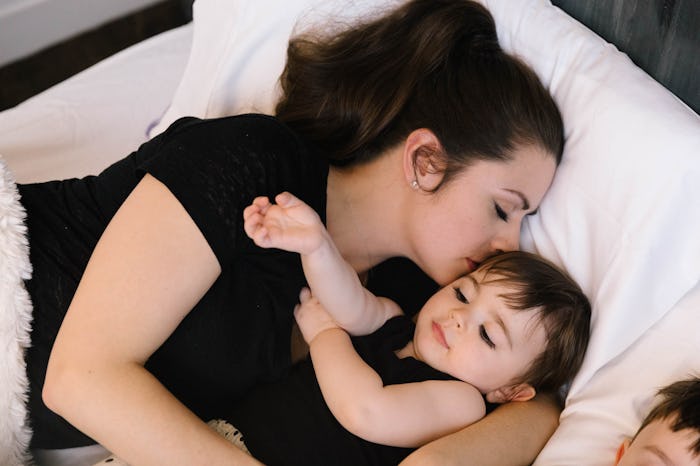Even if they haven't heard the phrase "sleep regression" before, most parents have or will experience one. They can come on suddenly, disrupt your routine, and to be perfectly honest, can seriously suck. They're also totally normal. So, what is the 12-month sleep regression? More importantly, what can exhausted, tired, over-worked parents desperate for a little shut eye do when a 12-month sleep regression hits? Believe it or not, even in your sleep deprived state, you'll make it through.
According to the Baby Sleep Site, the 12-month sleep regression happens at around 11 to 12 months of age. During this regression, your child may suddenly drop one of their naps. The site warns parents not to assume that their toddler is ready for a transition to no daytime naps, though, as most kids aren't ready to move to one nap until they are a bit older. Instead, parents should recognize that it's a regression — which the site describes as " a period of time (anywhere from 1 – 4 weeks) when a baby or toddler who has been sleeping well suddenly starts waking at night, and/or skipping naps (or waking early from naps) for no apparent reason" — and wait it out. Which is totally easier said than done, especially when you are tired.
Sleep regressions can seem like they happen out of the blue and for no apparent reason, but according to Linda Szmulewitz, a licensed clinical social worker and certified gentle sleep coach, sleep regressions happen right before your baby meets a new developmental milestone, like crawling or walking. As a result, your baby or toddler might spend time "practicing" their new skill when they should be sleeping. This also means that you probably won't know what's causing the problem until the regression has passed. Which, if you are anything like me, means that you'll think, "Oh, so that's why my baby hasn't slept in weeks," when they start walking or talking or being able to feed themselves.
So, what should parents do to help their baby get some sleep while they wait out the 12-month sleep regression? According to Szmulewitz's website, Sleep Tight Consultants, parents should comfort and support their babies, but try not to create any "sleep crutches" or bad habits that your baby might learn to depend on. For instance, rocking or nursing them to sleep is considered a "sleep crutch," and while it might work in the short term, in the long run it might prove detrimental to your baby's overall sleep schedule. Instead, the site suggests checking on your baby to let them know that you are there, but also letting them know that it is time to sleep and giving them the space to do so.
The Sleep Lady, Kim West, a licensed clinical social worker (LCSW), agrees. She recommends trying an earlier bed time or changing your child's schedule or routine. She also advises parents to remember that sleep regressions are temporary, and soon their baby or toddler will sleep again. However, if your child's sleep doesn't seem to improve after two to six weeks, her website warns that it might be a different issue entirely, and may require professional help from a sleep consultant or pediatrician.
In the end, and unless the problem persists, just continue to facilitate a healthy sleep schedule, and remind yourself that this, too, shall pass.
